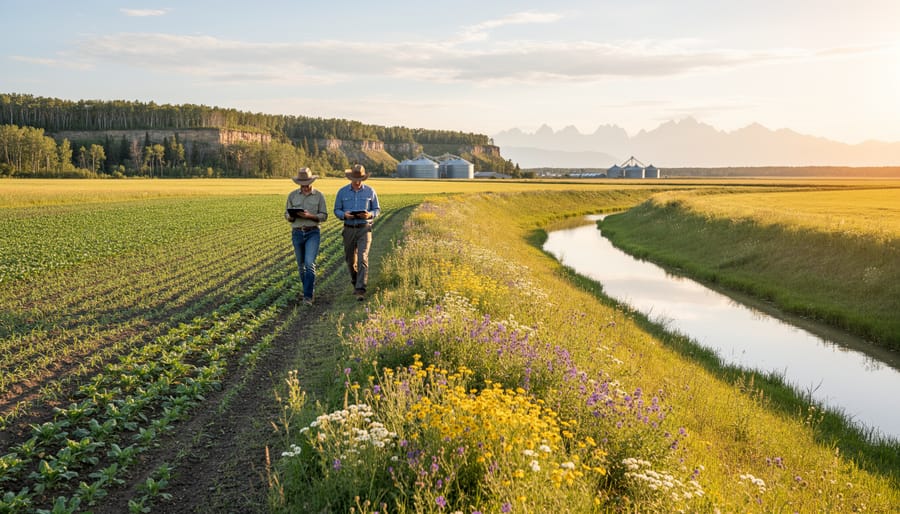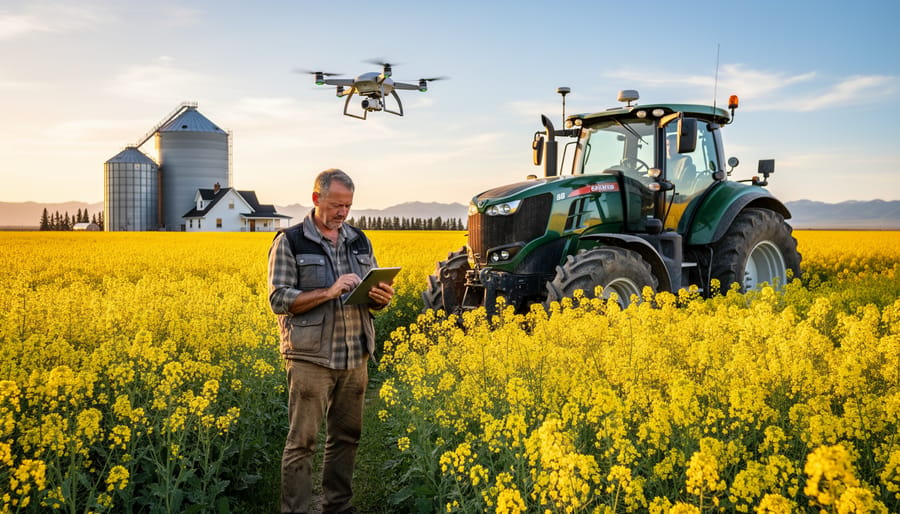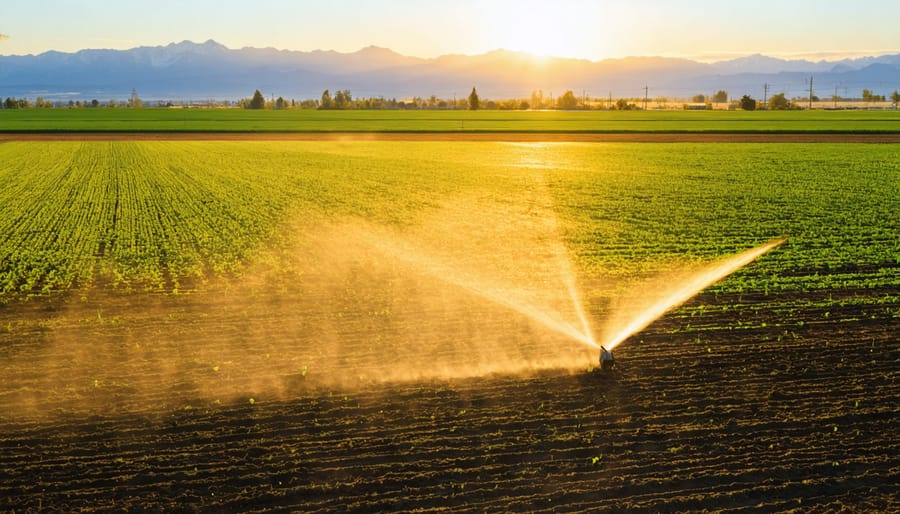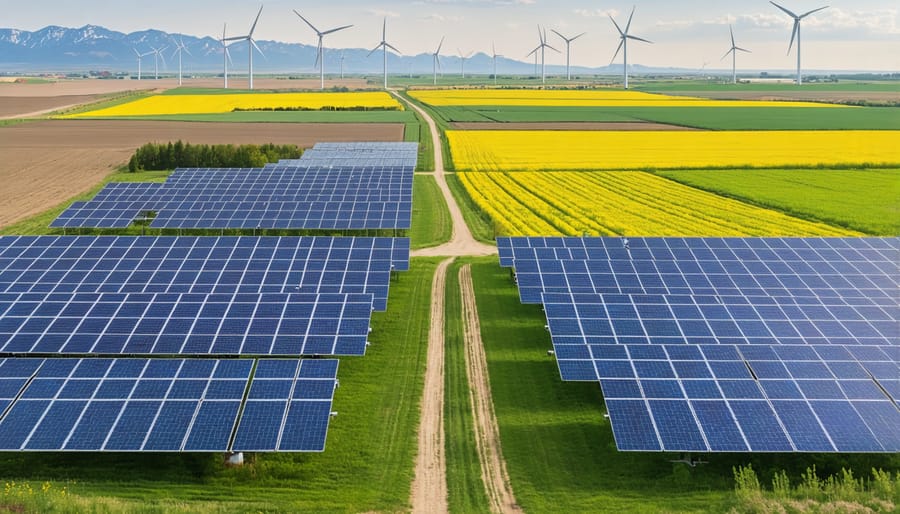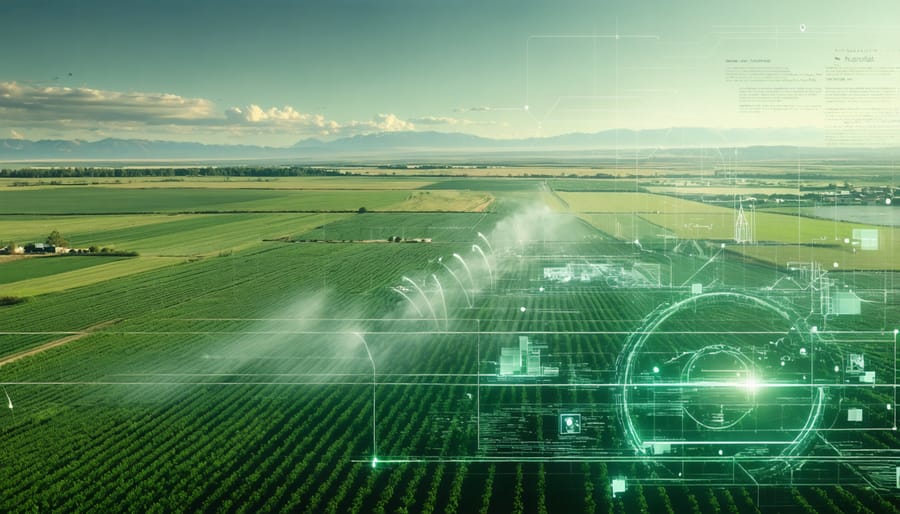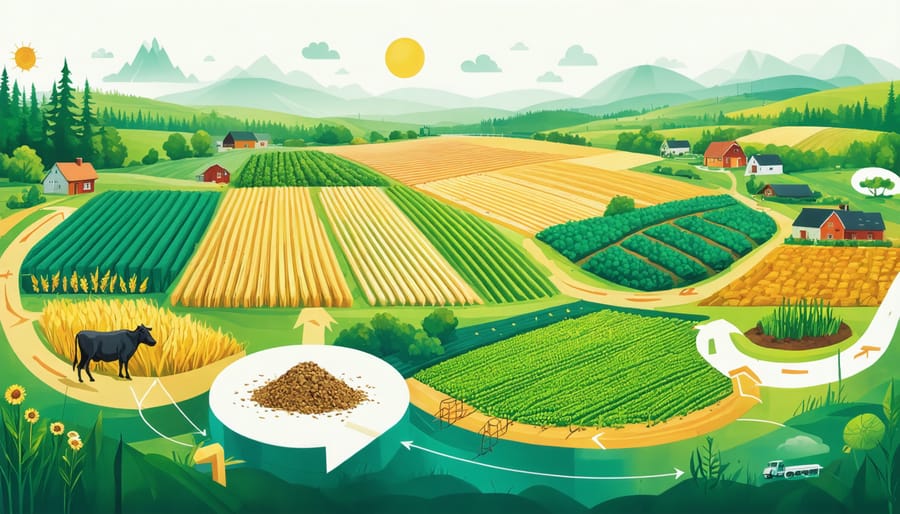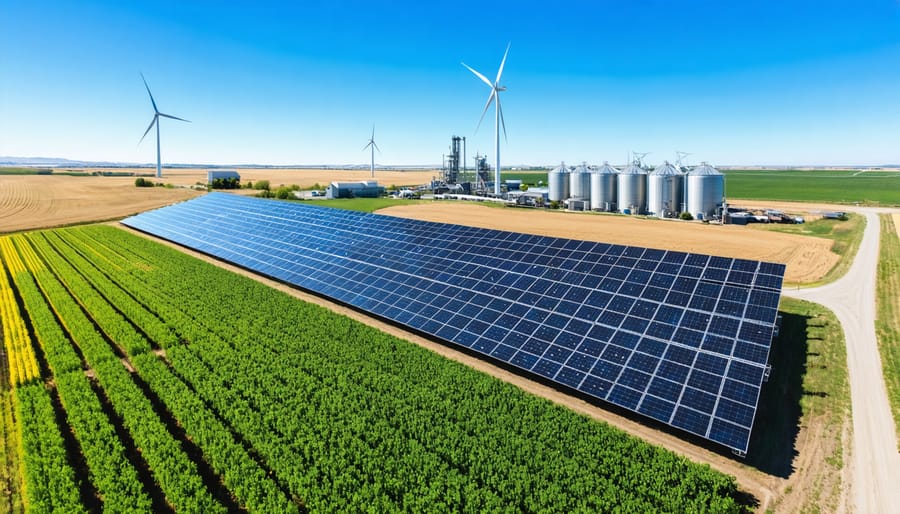Revitalize rural economies by leveraging digital infrastructure grants to establish community-driven fintech hubs, creating sustainable employment opportunities beyond traditional agricultural sectors. Deploy targeted workforce development programs aligned with emerging technologies, positioning rural communities at the forefront of the rural digital transformation. Implement collaborative economic development strategies that connect local producers directly to urban markets through e-commerce platforms, reducing dependency on intermediaries while maximizing profit margins for family farms.
Canadian rural communities possess unique advantages for economic growth – from abundant natural resources to strong social cohesion. By combining traditional agricultural expertise with innovative digital solutions, rural regions can build resilient, diversified economies that attract investment while preserving their distinct cultural identity. Strategic partnerships between local governments, agricultural cooperatives, and technology providers create sustainable frameworks for long-term development, ensuring rural communities thrive in an increasingly connected global marketplace.
Through measured implementation of these initiatives, rural areas across Alberta and beyond are witnessing unprecedented opportunities for economic renewal, proving that geographic location no longer limits access to markets or financial services.
How DeFi Is Reshaping Rural Alberta’s Financial Landscape

Traditional Banking vs. DeFi: The Rural Advantage
Rural communities have traditionally faced significant barriers when accessing financial services through conventional banks. Limited branch locations, restrictive lending criteria, and complex approval processes often leave farmers waiting weeks for crucial operational funding. However, the emergence of Decentralized Finance (DeFi) is reshaping this landscape, particularly as smart technology adoption in agriculture continues to grow.
Unlike traditional banks, DeFi platforms operate 24/7, allowing farmers to access loans, make payments, and manage investments on their own schedule. This accessibility is particularly valuable during critical periods like seeding and harvest, when timing can make or break a season’s success. DeFi also offers more competitive interest rates and reduced fees by eliminating intermediaries.
For Alberta’s farming communities, DeFi presents unique advantages in collateralization. While traditional banks might not recognize certain agricultural assets as collateral, DeFi platforms can accommodate various forms of digital assets and tokens, providing more flexible financing options. Additionally, smart contracts automate loan processes, reducing paperwork and approval times from weeks to minutes, helping farmers respond quickly to market opportunities or emergency needs.
Real Alberta Farms Using DeFi Today
The Smith family farm in Olds has revolutionized their grain operation by implementing DeFi lending protocols to secure operating capital. Sarah Smith explains, “Instead of waiting weeks for traditional financing, we accessed funds within 24 hours to purchase essential equipment during seeding season.”
Near Medicine Hat, the Peterson Brothers’ cattle ranch leverages yield farming strategies to maximize returns on their harvest income. “During off-seasons, our capital works for us through DeFi platforms, generating additional revenue streams we never had before,” shares Tom Peterson.
In the Peace River region, Michelle Wong’s family farm participates in a decentralized agricultural cooperative, using smart contracts for transparent profit-sharing and automated payments. Their innovative approach has reduced administrative costs by 40% while ensuring timely payments to all cooperative members.
These early adopters are paving the way for other Alberta farmers. Local agricultural tech advisor James Martinez notes, “We’re seeing increased interest from farmers who want to understand how DeFi can improve their operations. The success of these pioneers shows that blockchain technology isn’t just for tech enthusiasts – it’s a practical tool for modern farming.”
Smart Contracts and Sustainable Agriculture
Carbon Credit Trading Through DeFi
Canadian farmers are discovering new revenue streams through innovative climate-smart farming initiatives and carbon credit trading on decentralized finance (DeFi) platforms. This emerging opportunity allows farmers to earn additional income while contributing to environmental sustainability.
In Alberta, farmers implementing sustainable practices like no-till farming, cover cropping, and precision agriculture can now tokenize their carbon credits through specialized DeFi platforms. These digital marketplaces connect rural producers directly with businesses seeking to offset their carbon footprint, eliminating traditional intermediaries and reducing transaction costs.
The process is straightforward: farmers register their sustainable practices, verify their carbon reduction impact through approved methodologies, and receive tokens representing their carbon credits. These tokens can be traded on DeFi exchanges, providing immediate liquidity and fair market prices.
Local success stories include the Thompson family farm near Red Deer, which earned an additional $15,000 in 2023 by trading carbon credits from their 800-hectare regenerative agriculture operation. Similar initiatives are spreading across Prairie provinces, with cooperative groups forming to share knowledge and maximize trading potential.
For farmers new to DeFi, agricultural extension services and local tech cooperatives offer training programs and support. The key is starting small, understanding the verification process, and gradually expanding participation as comfort with the technology grows.

Crop Insurance Evolution with Smart Contracts
Smart contracts are revolutionizing crop insurance in rural Canada, offering farmers a more transparent and efficient way to protect their investments. Traditional crop insurance often involves lengthy claim processes and complex paperwork, but blockchain-based solutions are streamlining these operations for Alberta’s agricultural community.
In practice, these smart contracts automatically trigger insurance payouts when predetermined conditions are met, such as weather data showing rainfall below specific thresholds or temperature extremes. For instance, several farming cooperatives in Southern Alberta have implemented smart contract insurance pilots, reducing claim processing times from weeks to mere days.
Local farmer Jim Thompson from Lethbridge shares, “The new system means I don’t have to worry about lengthy claims processes. When we had that devastating frost last spring, the payment was in my account within 48 hours.”
The technology uses data from multiple sources, including weather stations, satellite imagery, and soil moisture sensors, to verify conditions and trigger payments. This removes the need for manual assessment and reduces the risk of disputes. Many Canadian insurers are now partnering with agtech companies to develop customized solutions that better serve our unique agricultural landscape.
For small-scale farmers, these innovations mean more affordable coverage options and better risk management tools. The system’s transparency also helps maintain fair pricing and reduces the likelihood of fraud, ultimately leading to more stable premiums for the farming community.
Building Rural Economic Resilience
Community-Led DeFi Projects
In recent years, several pioneering community-driven agricultural initiatives have successfully integrated DeFi solutions across rural Alberta. The Peace Region Agricultural Co-op stands out as a remarkable example, where local farmers pooled resources through a blockchain-based lending platform, enabling members to secure equipment financing at rates 40% lower than traditional banks.
In Manitoba’s Pembina Valley, the Prairie Grains Collective launched a token-based system allowing farmers to trade harvest futures directly within their community. This initiative has eliminated middleman costs and improved price stability for participating farms, with over 200 members actively engaged in the platform.
The Rocky View County Agricultural Association demonstrates another successful implementation, where their decentralized marketplace connects local producers directly with consumers. Their smart contract system has processed over $2 million in direct sales since 2021, with 90% of revenues staying within the community.
These projects share common success factors: strong community engagement, transparent governance structures, and practical educational support for participants. The Olds College Smart Farm has been instrumental in providing technical training, helping farmers understand and utilize these platforms effectively.
For communities considering similar initiatives, starting small with pilot projects has proven effective. The Drumheller Valley Agricultural Coalition began with just 25 members testing a micro-lending platform, which has since grown to serve over 150 local farms and agribusinesses. Their approach of gradual scaling while maintaining strong community oversight offers a blueprint for other rural regions looking to implement DeFi solutions.

Getting Started with Agricultural DeFi
Getting started with Agricultural DeFi doesn’t have to be complicated. We’ve broken down the process into manageable steps that any Alberta farmer can follow, regardless of their tech experience.
First, set up a digital wallet – think of it as your online bank account for cryptocurrency and DeFi transactions. Popular options like MetaMask are user-friendly and secure. Remember to store your recovery phrase somewhere safe and never share it with anyone.
Next, familiarize yourself with stablecoins, which are digital currencies tied to traditional money like the Canadian dollar. These provide a less volatile entry point into DeFi. Many Alberta farmers start with USDC or DAI due to their stability and widespread acceptance.
Once you’re comfortable with your wallet, explore agricultural lending platforms. These platforms allow you to use your farm assets or future crop yields as collateral for loans, often with better rates than traditional banks. Start small – perhaps with 5-10% of what you’d typically borrow – to get comfortable with the process.
Join local farming communities already using DeFi. The Alberta Grain Exchange hosts monthly meetups where experienced users share tips and help newcomers. Learning from fellow farmers who’ve already navigated this space can save you time and prevent common mistakes.
Consider starting with yield farming – a way to earn interest by providing liquidity to agricultural trading pairs. Many Alberta farmers begin with grain-backed tokens, earning between 5-15% annual returns on their digital assets.
Important safety tips:
– Only invest what you can afford to lose
– Double-check all platform addresses
– Start with well-established protocols
– Keep detailed records for tax purposes
– Update your security practices regularly
Remember, Agricultural DeFi is about building sustainable financial solutions for our farming community. Take your time to learn, start small, and gradually increase your involvement as your confidence grows.
Support is available through local agricultural extension offices and online communities. Many experienced Alberta farmers are willing to mentor newcomers, ensuring our rural communities benefit from these innovative financial tools together.
Risk Management and Best Practices
Managing risk in rural economic development requires a balanced approach that protects both financial investments and community interests. Start by conducting thorough feasibility studies before launching new projects, ensuring they align with local resources and capabilities. Regular consultation with agricultural experts and financial advisors can help identify potential challenges before they become serious issues.
Diversification remains a crucial strategy for risk management. Consider developing multiple revenue streams through varied agricultural products, value-added processing, or agri-tourism initiatives. This approach helps buffer against market fluctuations and seasonal challenges common in rural economies.
Insurance coverage specifically tailored to rural enterprises is essential. Work with providers who understand agricultural operations and can offer comprehensive protection against natural disasters, equipment failure, and market volatility. Many Canadian farmers find success by participating in government-backed risk management programs, such as AgriInsurance and AgriStability.
Best practices include maintaining detailed financial records and establishing clear operational protocols. Implement regular equipment maintenance schedules and ensure all staff receive proper safety training. Create emergency response plans for various scenarios, from severe weather events to market downturns.
Building strong relationships with local financial institutions can provide additional security during challenging times. Many Alberta-based credit unions offer specialized agricultural services and understand the unique needs of rural businesses.
Consider joining regional agricultural cooperatives or forming partnerships with neighbouring farms. These connections can help share resources, reduce operational costs, and provide mutual support during difficult periods. Regular participation in industry workshops and training sessions helps stay current with evolving best practices and risk management strategies.
The transformative potential of Decentralized Finance (DeFi) in rural economic development represents a pivotal shift in how we approach financial inclusion and growth in agricultural communities across Canada. Through the implementation of DeFi solutions, we’ve witnessed remarkable changes in how farmers and rural businesses access capital, manage risks, and participate in the broader financial ecosystem.
Throughout Alberta and beyond, innovative farmers are already leveraging DeFi platforms to secure operational funding, streamline supply chain payments, and create new revenue streams. These early adopters are showing us that the future of rural finance isn’t just about traditional banking – it’s about building resilient, interconnected financial networks that serve our unique agricultural needs.
The impact extends beyond individual farms to entire rural communities. By reducing dependency on traditional financial institutions, DeFi is enabling local economies to become more self-sufficient and resilient. Farmers are now able to access loans during crucial planting seasons, participate in global markets directly, and protect their operations against market volatility through innovative financial instruments.
Looking ahead, the potential for growth is substantial. As more rural communities embrace DeFi solutions, we can expect to see increased investment in agricultural innovation, stronger local economies, and more opportunities for young farmers to enter the industry. The technology is creating pathways for sustainable development while preserving the values and independence that make our rural communities unique.
However, success in this digital transformation requires a collaborative approach. By working together – farmers, tech developers, agricultural organizations, and community leaders – we can ensure that DeFi solutions are implemented in ways that truly serve rural needs. Education, infrastructure development, and community support will be crucial elements in this journey.
As we move forward, it’s clear that DeFi isn’t just another technological trend – it’s a powerful tool for rural economic empowerment. By embracing these innovations while staying true to our agricultural heritage, we can build a more prosperous and sustainable future for rural Canada, one community at a time.


